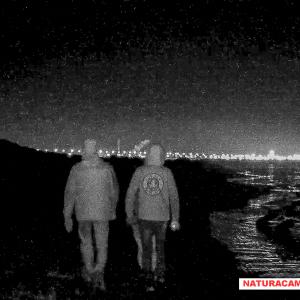
03:21:24

Mohammed and Saleh walk steadily on the shore of the beach, heading to the port security zone. In the distance the English coast (lights, shapes) can be inferred. All you have to do is stretch your arm to make this dream of freedom a reality. 33.30 kilometers separate Calais from Dover. Some of the inhabitants of the Jungle take the risk of attempting to intrude swimming on the port, equipped with a neoprene. An unacceptable risk if you take into account the perpetual traffic in this maritime highway starting on the port of Calais.
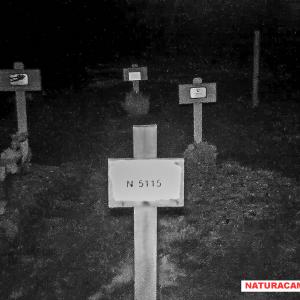
19:26:58

In the northern cemetery, 28 east-facing tombs testify to a frustrated "Fajara". 28 migrants were found dead, trampled on the motorway or electrocuted with the train wires after jumping on it while they tried to cross, all this after falling of the truck that could have taken them to England.
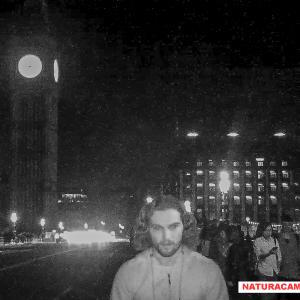
22:07:50

On June 30, 2016, Ahmad, a 26-year-old from Samarra, Iraq, finally arrives in England after having spent 12 months in the Jungle of Calais where he repeatedly tried to get "Fajara". In early 2017, the British government has rejected his asylum claim because at the time of his departure, Iraq was allegedly not at war. He wonders why he then had to flee after seeing his two brothers and his two uncles dead at the hands of militias. Ahmad now begins a new legal struggle to get an identity and a place to live and feel free.

19:57:11

Close-up portrait of an Afghan child taken on the fourth day of the camp demolition. He has just received his "bambino" bracelet for being a minor. He has the chance of being housed in one of the 125 containers intended to accommodate minors in Calais, until their transfer to CAO orientation centers. Muhammed Idriss knows full well that he will not be able to access England via family reunification. There is no family there. Now his nights in Calais are numbered, as are the dougars. Today he will go out looking for one, like almost every night for the last 4 months, set to avoid recycling his dream.
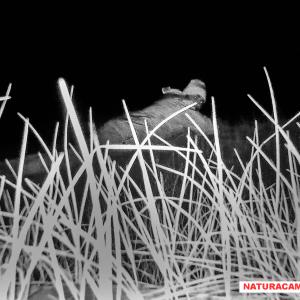
03:38:44

Ahmad is lurking among the dunes on the beach behind the Jungle. He monitors the shift change of the agents, which happens at 4 am, in order to try to reach the port fences. Here everything is strategy and patience. Long waits that Ahmad distracts by chatting with his friends and close relatives, even in Syria: it is his way of bracing up and avoid going down.
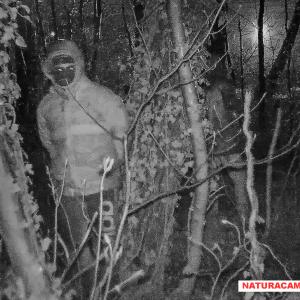
02:50:19

We hide from the police in what used to be the ancient jungle of Calais, located 500 meters from the current one. The term "jungle" has been used for the first time by Afghan and Iranian migrants after the destruction of Sangatte camp in 2002. They took refuge in this "Jangal", "forest" in Persian. Police patrol day and night uninterruptedly on the perimeter of the Jungle. With their presence they try to dissuade the inhabitants of the camp from walking towards the strategic crossing points of the Eurotunnel, the motorways or the port.
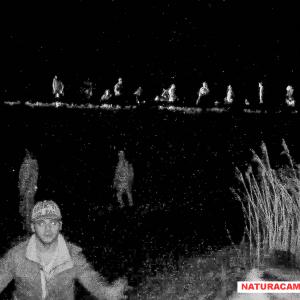
01:59:58

Dougar on the A16 motorway. Hundreds of people of sudanese, iraqi, kurdish, afghan and syrian origin mount barricades with tree branches to stop the trucks entering the port of Calais. This is the second attempt aborted by tear gas and police reprisals this evening. Horns, shouts of truckers or refugees and gas projections are the "night night" for all. Panic and confusion spread. Nights before a 22-year-old Pakistani boy lost his life on this same segment of the motorway crushed by a truck.
Password: Fajara 00:49:49
Since 2003, Calais, a port town, was converted into a strategic point from which to enter the UK without having to rely on smugglers. Here everybody has an opportunity and for this reason, when day falls, everyone, regardless of their origin or gender, gets united to reach their common goal : Do Fajará !
Fajará, a word that in Arabic means explosion, blow it! but that in the "jungle" the word gets another meaning, arriving safe at port, -at Dover. Every -night the inhabitants of the "Jungle" get together to do some "Dougar", that is to build barricades that will create traffic jams for the trucks going to England and allow some of them to jump inside the trailers. These frequent happenings on the motorway to Calais imply another regular theatre: confrontation with the police and truck drivers. Constantly Mohammed, Ali, Khan and many others are facing danger, are playing with death and some ... are losing. In the cemetery of Calais lie 28 immigrants, of which 16 died in 2016. Their graves, unlike the adorned ones that surround them, are marked by numbers written on wood stuck into the ground, without further ado. And this is the way they died, without further ado.
"Password: Fajara" describes the moments of risk at night, of hiding and waiting, of attempts to pass and of some successful ones. The images "Fajará to death" have been made possible thanks to the complicity between the immigrants and the photographer, after the latter lived six months in the "jungle" and developed a photo workshop for a group of them, a project called "Jungleye". The images have been taken with an infrared camera for hunt. The aesthetic given reminds one of "surveillance" images but this time the camera instead of being watchman is accomplice. This time it become allies with the ones building "dougar", with the ones doing "Fajara" to keep an eye on "Abbas", the police in the jargon of the "Jungle".
"Password: Fajara" is showing a dark present. The distorted images that Europe is forecasting are giving dreams to some that have to leave their home to make their life liveable. Caught in the seams of Europe, they are surviving in inhuman conditions. In this being that is not, where even the dead are losing their names, the old language doesn't mean anything anymore, for this reason in the Jungle new words have to be invented. "Fajará to death" is taking part in this impulse: giving name or making image to reveal the world.
Caption: Third night of the Jungle demolition. Smoke from tear gas and from an unidentified fire is mixed. The Sudanese burning camp alerts the watchmen of the other communities installed on the roofs of the shacks. Mobile phones, walkie talkies and fire extinguishers are the tools they share to protect each other when firefighters, ambulances or police officers are in short supply as chaos arises.
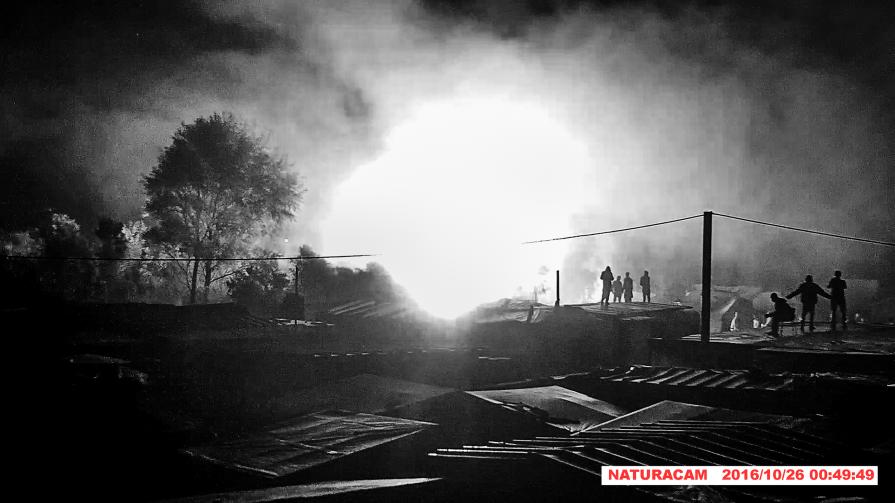
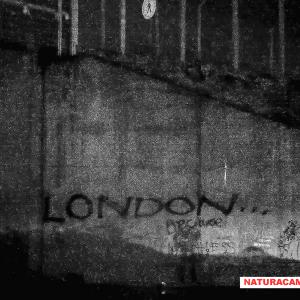

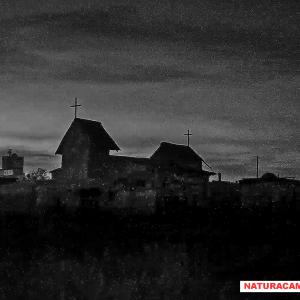














Comments 0
Say something